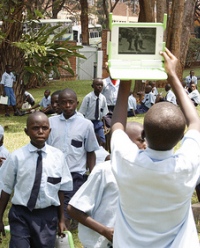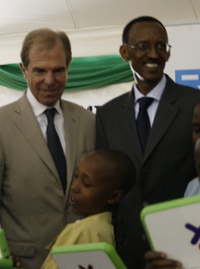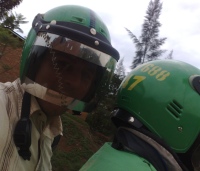What happens when you throw 30 teams of jet-lagged college students into a two week training course on OLPC deployment with the President of Rwanda, Nicholas Negroponte, and the promise of $10,000 + 100 XO laptops? An OLPCoprs Africa experience that puts MTV's "Real World" to shame in its roller coaster of highs and lows.
First, let's have Hassan tell us about the training location:
Kigali is such a beautiful place. The entire landmass is dotted with plenty greens, trees and a myriad of wonderful people. One remarkable thing about the city was its 'cleanliness'. The environment was clean in every sense of the word.
Oh yeah, Rwanda is damn impressive. Nothing like a dollar denominated donor economy to keep business booming in Kigali no matter the Great Recession. But not everyone was chipper about the early morning training starts, as Katie notes:
"Jet lag" and "5am" should never be in the same thoughts.
But the thoughts of the OLPCorps volunteers are very interesting as they learn more about One Laptop Per Child's XO deployment methodologies. Here is Stephanie explaining the challenges of using constructionist methodologies in traditional educational systems:
The word "curriculum" has become a derogatory, don't-use form of swearing here at orientation. OLPC has created a computer that emphasizes constructionist education and their manner of inculcating the computers into global classrooms is, of course, constructionist. The teachers know the local curriculum better than any volunteer or OLPCorps member ever will in two months. Therefore, the goal is to enable teachers to introduce the XO into their own curriculum through making them comfortable with the computer and its activities.
In theory, this is a great approach. However, it requires teachers to be flexible and willing to change the way they think about organizing class time. It becomes mandatory for teachers to use a form of education that they themselves have never used nor witnessed. For teachers who have been in the classroom for decades, this task is difficult, to say the least.
The task is made more difficult when OLPCorps volunteers hear what Nicholas Negroponte has to say about the objectives of their 10-week African experience. Unlike the original OLPC mission, he has a much more commercial hope for the program, as understood by Katie:
According to Negroponte, OLPCorps was designed with the main objective of, not improving educational opportunities for kids as I originally thought (or was led to believe), but instead igniting a grassroots movement in our respective African countries that inspires community members to call on their governments to join the OLPC bandwagon.
In other words, Corps teams deploy 100 laptops to 100 children in a community with much more than 100 children. The community is exposed to the greatness of the XO laptop, those who don't have laptops want them, and so the community puts pressure on the government to reform the education system, and spend 75% (this figure was an example given by one of the government officials at the conference) of the education budget on a bulk purchase of XO laptops for the country.
Lest you think that Katie was alone in her change of opinion, we also have "Ashyia" realizing that OLPC doesn't follow a bottom-up approach, which begets a fundamental question about the whole OLPC program:
OLPC is not a response to an identified problem, that was developed with the help of the community that it will be used in. It was an idea that some professors came up with to push a new idea in educational policy, and then decided to use the laptops to solve it [...]
When we were working in the Rwandan schools on Friday and Monday, it felt like we were forcing this technology on the teachers, that we were creating a great burden and task for them, which is something that I have never felt before on a development trip. And yes, the kids love them, an of course they are a great tool for them, but is this really development?
Personally, while I have issues with its design and there are better ways to leverage the volunteers' efforts, OLPCorps is development. Even OLPC is development. And Eli makes a great point on OLPC's development impact:
Would $200 worth of books would have a greater impact? I don't think we will ever know the best method of changing educational policy or exposing young children to the vast world around them, but I feel that more investment in the future is good and if it is easier to motivate educational policy-makers about a cool technology rather than some other idea then I strongly encourage that investment.
And I heartily encourage OLPCorps volunteer teams to invest in their amazing opportunity to experience the messiness of international development first-hand. An opportunity that deep down, I am damn jealous of.
Ah to be a birthday boy on the boat again, seeing Africa through the fresh eyes of OLPCorps volunteers like Rachel, with her pictorial impressions of Uganda.
If you too want to experience OLPCorps vicariously, I've created a feed reader of all the OLPCorps blogs that's also displayed in the right sidebar here on OLPC News.
Join me in following OLPCorps, and join Nadeem to:
[I]magine what will happen to literacy stats when children have ultimate access to reading resources and opportunities via ebooks and online exploration.
A dream that is made possible by all the OLPCorps Africa participants.
Stay current with OLPCorps Africa: subscribe to OLPC News via RSS Feed, Email or Twitter.





As usual Wayan is already publishing information by the time I just find it... Let me share a few links to OLCorps blogs - a few at a time since I can only post 3 links per comment
South Africa/Gettysburg College Blog
http://gtech-olpc.blogspot.com/
Rwanda/Utah State University/Ungana Foundation
http://www.unganaxo.blogspot.com/
Kenya/Baylor/UT at San Antonio/Invisible Children
http://ubcolpc09.wordpress.com/
Mauritania/University of Miami/University of Minnesota
http://africaxo.blogspot.com/
Mauritania/Cornell
http://www.cornellolpc.com/
Uganda/UC Berkeley Blog
http://berkeleyolpc.wordpress.com/
Tanzania/Tumaini University
http://mot-tumaini.blogspot.com/
Ethiopia/Dalarna University and The Royal Institute of Technology(KTH)
http://www.olpc2009ethiopia.blogspot.com/
Sierra Leone/Princeton/University of Maryland
http://olpcsm.blogspot.com/
Nigeria/University of Lagos
http://olpc4nigeria.blogspot.com/
Nigeria/University of Ibadan
http://abledisableinxo.blogspot.com/
OLPCorps Tulane University & UC Davis – Sierra Leone
http://olpckenema.wordpress.com/category/olpcorps/
(BTW, thanks to that Tulane/UC Davis blog for the URLs)
Or you could always just read the OLPCorps Africa bloggers feed I made expressly to save everyone the trouble of making thier own from all the links above (and a few more too).
@Wayan, It's a great synthesis... until you wax, uh, excuse me, sophomoric: "And I heartily encourage OLPCorps volunteer teams to invest in their amazing opportunity to experience the messiness of international development first-hand. An opportunity that deep down, I am damn jealous of. (snip) Ah to be a birthday boy on the boat again, seeing Africa through the fresh eyes of OLPCorps volunteers like Rachel, with her pictorial impressions of Uganda... I've created a feed reader of all the OLPCorps blogs...Join me in following OLPCorps, and join Nadeem to: '[I]magine what will happen to literacy stats when children have ultimate access to reading resources and opportunities via ebooks and online exploration.' A dream that is made possible by all the OLPCorps Africa participants."
Come on now, all the concrete and experiential information that you're providing suggests that what is happening is what could/should/was expected to happen. Don't treat us like children. We understand that the project in Rwanda will suck miserably for at least part of the first iteration--it's a development project, uh?--and we hope, with you, that the volunteers and the Rwandese collectively figure out a way to get real value out of the XO before too much time passes... (Remember, Paul K is invested face-wise: if the project can see the right way to go [in re curriculum, assessment, teacher training] he'll enable it to go that way.) So we're interested, we're supportive. Even expectant. But we aren't asking to be patronized.
Ed,
Maybe you forget that I come from the implementation side - I'd love to be in OLPCorps as its the experience of a lifetime. So if you'll excuse me, I will speak to my love of the adventure that is development in Africa.
That does not diminish my disappointment that OLPCorps wasn't designed better, or that Negroponte didn't make it so explicit that his goal is XO laptop sales, not education.
Ed, I can understand about sucking miserably 'cause you had no choice, but why, why suck miserably by design? OLPCorps had a chance to show success through community collaboration, engaging a good proportion of the many active OLPC volunteers worldwide, and adding to them, but a very specific series of choices by management closed that door. One of many results is that this project, announced as grassroots, based in collaboration, teamwork, sharing & all such Web 2.0 Good Things, ends up encouraging little of any of that, we don't know if by mistake or by design, and while we love these blogs, it would be nice, for example, to also know who are the rest of the teams, the content of the "trainings" given at Kigali, etc. Is there a Director for OLPCorps? If by any chance other volunteers could help, how could they join in? etc....
"We understand that the project in Rwanda will suck miserably for at least part of the first iteration--it's a development project, uh?--and we hope, with you, that the volunteers and the Rwandese collectively figure out a way to get real value out of the XO before too much time passes..."
There is another pessimistic post about XO deployment here:
http://jessemcv.blogspot.com/2009/06/laptops-and-appropriate-technology.html
A teacher found forgotten XOs in a covered by dust box in school in Malawi.
It’s a shame that Wayan published this before we posted our final positive thoughts on the training. It’s always nice to know that one’s thoughts are appreciated; however, the quotes from our blog (three times!) make more sense in context. If you would like to hear our overall thoughts about the training, please see “OLPC Redeemed.” Also, if you would like to read about the true roller coaster of the training (please note: I love roller coasters), see “The OLPC Roller Coaster” in full. Thanks!
http://olpckenema.wordpress.com
Katie, you wouldn't know how important your rollercoaster note is, and how much we respect your courage.
It is not we like "bad news", it is that we like our news balanced, and very few people dare to report negative results. Why? who knows, maybe they are afraid they will be blamed, personally.
Probably you were taught in College that even unexpected, "negative" results are important in science, as much, and sometimes even more than to "prove" something right away.
Those of us who have been a while around projects in developing countries tend to grow suspicious when no problems are reported, and instead OLPC officials serve infomercials on how everything will be OK and get sorted out by itself.
Of course we wish for good news. Either kind needs evidence. Your post shared evidence, maybe the largest percentage of all the evidence that has been shared so far on how the OLPCorps training happened. Good and not so good.
If OLPCorps and the Learning Team were more open in sharing informations, it would be easier not to have growing, serious concerns about how this will end up.
We are most grateful to you.
And allow me to repeat your invitation to all, the olpckenema blog is worth following direct, also, though IMHO the "newsy" approach Wayan gave it has its place also.